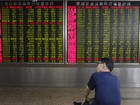Stock markets rose for the most part on Friday following a recovery on Wall Street that helped to ease global recession fears.
 Full Story
Full Story
The Turkish military pension fund OYAK said Friday it had signed a provisional deal to buy British Steel after the UK steelmaker was forced into liquidation in May.
 Full Story
Full Story
American consumers appear to be carrying the US economy in their shopping carts as manufacturing slumps amid President Donald Trump's trade conflict with China, and financial signals warn of a possible recession.
"The economy is phenomenal," Trump said Thursday. "We had a couple of bad days but we are going to have some very good days because we had to take on China."
 Full Story
Full Story
South Africa on Thursday announced visa waivers for four countries in a bid to boost tourism amid an economic crisis and falling visitor numbers.
 Full Story
Full Story
Asian equities rose Wednesday as investors breathed a collective sigh of relief at news the US had delayed tariffs on a swathe of Chinese goods, easing tensions in their bitter trade war.
 Full Story
Full Story
Hong Kong shares sank more than two percent Tuesday following steep losses on Wall Street, with investors hit by worries over political unrest in the city as well as uncertainty about the China-US trade standoff.
 Full Story
Full Story
Singapore further cut its annual growth forecast on Tuesday as the escalating US-China trade war hammers exports, in another ominous sign for Asia's trade-reliant economies.
 Full Story
Full Story
Britain's economy unexpectedly shrank in the second quarter of the year on Brexit turmoil, official data showed Friday, placing the country on the verge of recession and sending the pound tumbling to a 2.5-year low.
 Full Story
Full Story
British food delivery company Deliveroo said Monday it would pull out of Germany entirely this week, saying it plans to focus on more promising markets elsewhere.
 Full Story
Full Story
A few steps from the sea in the Normandy resort of Deauville, a group of curious holidaymakers in flip-flops and beach garb pepper a technician with questions as he extols the capabilities of a cutting-edge 3D modelling machine.
 Full Story
Full Story



